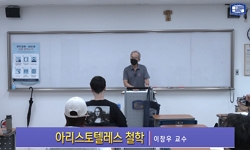It was not until the complete translation of the Nicomachean Ethics by Robert Grosseteste that the Latin world became acquainted with Aristotle’s ethics, and it was Albert the Great who became a pioneer in the development of ethics in the Medieval A...
http://chineseinput.net/에서 pinyin(병음)방식으로 중국어를 변환할 수 있습니다.
변환된 중국어를 복사하여 사용하시면 됩니다.
- 中文 을 입력하시려면 zhongwen을 입력하시고 space를누르시면됩니다.
- 北京 을 입력하시려면 beijing을 입력하시고 space를 누르시면 됩니다.

윤리학의 학적 성격 -알베르투스의 전기- 『윤리학 주해』(Super Ethica)의 서문 분석- = On Albert’s View on Ethics as a Scientific Discipline Shown in the Prolog of His Super Ethica
한글로보기https://www.riss.kr/link?id=A108580302
-
저자
박규희 (예나대학교 철학과)
- 발행기관
- 학술지명
- 권호사항
-
발행연도
2023
-
작성언어
Korean
-
주제어
Albert the Great ; Aristotle ; Nicomachean Ethics ; Ethics ; Commentary ; Happiness ; 알베르투스 ; 아리스토텔레스 ; 니코마코스 윤리학 ; 윤리학 ; 주석서 ; 행복
-
등재정보
KCI등재
-
자료형태
학술저널
-
수록면
71-113(43쪽)
- 제공처
-
0
상세조회 -
0
다운로드
부가정보
다국어 초록 (Multilingual Abstract)
It was not until the complete translation of the Nicomachean Ethics by Robert Grosseteste that the Latin world became acquainted with Aristotle’s ethics, and it was Albert the Great who became a pioneer in the development of ethics in the Medieval Ages with his commentary on Ethics. Albert’s interpretation of Aristotle’s theories of moral happiness and contemplative happiness unifies them, and this reading is the basis for establishing the autonomy of Aristotelian ethics as science. Having demonstrated that scientific knowledge of human moral behavior is possible, Albert goes on to identify the scientific character of ethics by situating it within three formal categories. First, the subject-matter of ethics are human behavior and happiness, which Albert distinguishes as the final intention of ethics and common subject, respectively, and establishes a unity of subject-matter by establishing an order between them. Second, ethics is divided into political science and economics according to the kind of good, yet Albert believes that these two disciplines actually form a single ethical system because they have a relation of principle or cause and effects to ethics. Third, ethics is bound to define its purpose and research method within the dichotomy of “ethica docens” and “ethica utens”, but Albert harmonizes moral practice and ethics by understanding these two as corresponding to the relationship between the subject-matters of ethical study, that is, the relationship between the final intention and the common subject. Authorizing Aristotelian ethics as an independent science, Albert opens up a possibility of discussing virtue, ethics in general, and happiness in a Christian-theological context. This paper analyzes Albert’s views on the disciplinary form of ethics by examining the preface to his First Commentary on the Nicomachean Ethics (Super Ethica).
동일학술지(권/호) 다른 논문
-
- 한국가톨릭철학회
- 강상진
- 2023
- KCI등재
-
‘철학자의 외투’를 입은 그리스도교 -순교자 유스티누스의 그리스도교 철학 관념-
- 한국가톨릭철학회
- 송유레
- 2023
- KCI등재




 KISS
KISS






